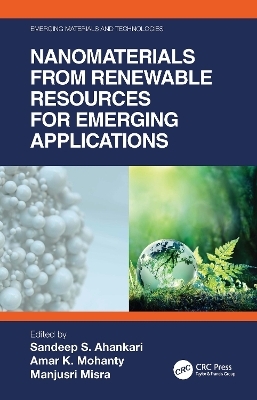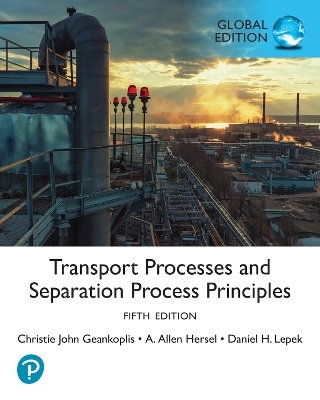
Nanomaterials from Renewable Resources for Emerging Applications
Taylor & Francis Ltd (Verlag)
978-1-032-15672-9 (ISBN)
- Noch nicht erschienen
- Versandkostenfrei
- Auch auf Rechnung
- Artikel merken
• Introduces fundamentals of nanomaterials from renewable resources, including processing and characterization.
• Covers nanomaterials for applications in food and packaging, including nanocellulose, lignin- and chitosan-based nanomaterials, and nanostarch.
• Discusses applications in energy conservation, such as supercapacitors, electrolyte membranes, energy storage devices, and insulation.
• Describes environmental uses such as water remediation and purification and oil spill clean-ups.
• Highlights advantages and challenges in commercialization of green nanoparticle-based materials.
Equally beneficial to researchers and professionals, this book is aimed at readers across materials science and engineering, chemical engineering, chemistry, and related fields interested in sustainable engineering.
Sandeep S. Ahankari is Associate Professor in the School of Mechanical Engineering at VIT University, India. He pursued his PhD in Materials Science from IIT Kanpur, India and postdoctoral research at University of Guelph, Canada. His areas of interest include processing and thermo-mechanical characterization of bio/polymer nanocomposites and functionally graded composites. He is currently working on two projects of SERB, DST, India. The Start-up Research Grant aims at the facilitated separation of CO2 from biogas through membrane technology while the ASEAN-India Collaborative Research and Development focuses on the fabrication of flexible, shape memory supercapacitor for wireless health monitoring devices. He has 20 international journal papers, more than 20 international conference papers, 14 book chapters, and 5 filed patents to his credit. Amar Mohanty is currently a Professor and a Distinguished Research Chair in Sustainable Biomaterials at the Ontario Agriculture College (OAC) in the Department of Plant Agriculture and holds a joint appointment in the School of Engineering at the University of Guelph. He serves as the Director of the Bioproducts Discovery and Development Centre at the University of Guelph, Canada. Dr. Mohanty is an internationally recognized leader in the field of sustainable polymers and biobased composites. His interest and expertise include circular economy, environmental sustainability, waste plastic valorization, biodegradable plastics and biocarbon based composites. His recent interest is development of advanced flameproof sustainable composites for battery enclosures and other parts to reduce weight of electric vehicles. Dr. Mohanty’s vision in circular economy and innovation in bioproducts for mitigating climate change has catalyzed a number of discoveries. He has had a major impact in the field, being one of the most cited researchers in advanced biobased material science and engineering. He has more than 800 publications to his credit, including 444 peer-reviewed journal papers, 70 patents (awarded/applied), 5 edited books, 21 book chapters, 300+ conference papers and over 150 plenary and keynote presentations. His Google-Scholar citations count is 45,284 and h-index 95 (July 24, 2022). Dr. Mohanty is a Fellow of the American Institute of Chemical Engineers (AIChE), Society of Plastic Engineers (SPE), Royal Society of Canada and Royal Society of Chemistry, UK. He is the Editor-in-Chief in Sustainable Composites of Composites Part C: Open Access - an ELSEVIER journal.Dr. Mohanty’s achievements have been recognized with many awards such as the Lifetime Achievement Award from the BioEnvironmental Polymer Society (BEPS), USA; Andrew Chase Forest Products Division Award from the American Institute of Chemical Engineers (AIChE); the JL White Innovation Award from the International Polymer Processing Society, the Synergy Award for Innovation from Natural Sciences and Engineering Research Council (NSERC) of Canada and the prestigious Miroslaw Romanowski Medal from the Royal Society of Canada (RSC) for his significant scientific contributions to the resolution of environmental problems. Dr. Manjusri Misra is a professor and Tier 1 Canada Re-search Chair (CRC) in Sustainable Biocomposites in the School of Engineering and holds a joint appointment in the Department of Plant Agriculture at the University of Guelph as well. She is the Research Program Director of the Bioeconomy Panel for the Ontario Agri-Food Innovation Alliance, a program between the Ontario Ministry of Agri-culture and Rural Affairs (OMAFRA) and the University of Guelph, Canada. Dr. Misra completed her Bachelors, Master’s, MPhil and PhD from Ravenshaw College at Utkal University in India focusing in Chemistry with a specialization in Polymer chemistry and Natural Fibers during her graduate program. Dr. Misra’s current research focuses primarily on novel bio-based composites and nanocomposites from agri-cultural, forestry and recycled resources for the sustainable bioeconomy moving towards Circular Economy. She has authored more than 750 publications, including 436 peer-reviewed journal papers, 23 book chapters, and 53 patents. She was the editor or co-editor of 5 books in the area of bio-composites and nano-composites. In 2020, she was selected as one of Canada's Most Powerful Women: Top 100 Award Winner in the Manulife Science and Technology category from the Women Executive Network. She is a Fellow of the Royal Society of Chemistry (UK), the American Institute of Chemical Engineers (AIChE), and the Society of Plastic Engineers (SPE).
1. Introduction to Nanomaterials from Renewable Resources.
2. Processing and Characterization of Materials Containing Green Nanofillers. Part I: Food and Packaging.
3. Developments in Chitosan Based Green Nanocomposites for Food Packaging Applications.
4. Recent Advancements in Barrier Properties of Lignin Nanomaterial Based Composites.
5. Modified Hydrophobic Starch- an Alternate Green Material for Packaging Industry.
6. Renewable Nanocomposites for Antibacterial Active Food Packaging.
7. Applications of Nanostarch in Food Industry. Part II: Energy Conservation.
8. Advances in Nanocellulose Based Materials for Electrodes in Supercapacitors.
9. Employment of Green Polysachharide Nanoparticles in Electrolyte Membranes.
10. Nanocellulose Based Separators for Energy Storage Devices.
11. Employment of Lignin in Energy Storage Devices.
12. Nanocellulose Based Facilitated Transport Membranes for Biogas Upgradation.
13. Nanocellulose Based Aerogels for Thermal Insulation and Flame Retardant Applications. Part III: Environment.
14. Recent Developments in Chitin/Chitosan Based Adsorbents for Removal of Water Pollutants.
15. Nanocellulose Based Membranes for Water Purification.
16. Nanocellulose Based Aerogels for Oil-Spill Removal.
17. Renewable Resource Derived Activated Nanocarbon for Water Purification.
18. Potential Applications of Polysaccharide Based Aerogels.
19. Future Outlook.
| Erscheint lt. Verlag | 30.6.2023 |
|---|---|
| Reihe/Serie | Emerging Materials and Technologies |
| Verlagsort | London |
| Sprache | englisch |
| Maße | 156 x 234 mm |
| Themenwelt | Technik ► Umwelttechnik / Biotechnologie |
| ISBN-10 | 1-032-15672-4 / 1032156724 |
| ISBN-13 | 978-1-032-15672-9 / 9781032156729 |
| Zustand | Neuware |
| Haben Sie eine Frage zum Produkt? |
aus dem Bereich


